|
|
|
Sort Order |
|
|
|
Items / Page
|
|
|
|
|
|
|
| Srl | Item |
| 1 |
ID:
163786


|
|
|
|
|
| Summary/Abstract |
Tensions flared for a time after North Korea’s fifth and sixth nuclear tests as well as
THAAD’s entry into South Korea. This paper extends the view that the root cause
of these issues is the lack of regional public goods (RPGs) on the Korean Peninsula,
and its insufficiency results from three major conflicts in the politico–economic
situation of the Peninsula. In order to resolve the issues and maintain lasting peace,
three specific aspects, i.e., in diplomacy, security and economy, are to be addressed
in carrying out the long-term mission of supplying RPGs to the Peninsula. For
effective operation and comprehensive management of the RPGs provision, an
integration platform with powerful commitments is called for, i.e., “Association of
Trans-Korean Peninsula Nations” (ATKPN) co-established by China, the United
States, and the two Koreas. Apart from the dilemma commonly identified in the
delivery of RPGs, the ATKPN also faces dilemmas specifically from the Northeast
Asian order. To overcome the ATKPN’s obstacles, concerted efforts are needed to
promote the institutionalization of Sino–U.S. “new type of great power relations,”
to transform the function of the alliance system, and to cultivate the awareness of
“common external threats.”
|
|
|
|
|
|
|
|
|
|
|
|
|
|
|
|
| 2 |
ID:
097100
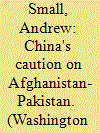

|
|
|
|
|
| Publication |
2010.
|
| Summary/Abstract |
The ongoing crisis in Afghanistan and Pakistan looks like a prime candidate for closer cooperation between the United States and China. There are various broadly shared interests in combating terrorism, containing rising extremism, and supporting the stability of both states. With its extensive influence in Pakistan and substantial economic capacity, Beijing has important assets to bring to the table. In practice, however, efforts to achieve convergence have proved frustrating. Differences run deep over how to address the extremist threat and the broader geopolitics of the region. And as is true of its foreign policy elsewhere, China pursues a relatively narrow conception of its interests in Afghanistan and Pakistan, rather than supporting a more widely shared set of goals.
|
|
|
|
|
|
|
|
|
|
|
|
|
|
|
|
| 3 |
ID:
130609
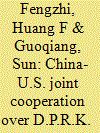

|
|
|
|
|
| Publication |
2014.
|
| Summary/Abstract |
In February 12, 2013, North Korea announced it had successfully Conducted its third underground nuclear test. After such a dangerous move, the U.S. and South Korea tightened their bilateral security cooperation and beefed up defense measures. This caused tensions to escalate on the Korean Peninsula, and the situation appeared to spin out of control. The crisis pushed China and the U.S. together to work on this issue. This article will analyze those deep-seated factors affecting bilateral cooperation and make an initial exploration 'of its prospects while providing an overview of their joint actions to solve the North Korean nuclear issue.
|
|
|
|
|
|
|
|
|
|
|
|
|
|
|
|
| 4 |
ID:
157247


|
|
|
|
|
| Summary/Abstract |
On September 3, 2017, North Korea conducted its sixth nuclear test, that of a hydrogen bomb, which can be mounted on an intercontinental ballistic missile. Pyongyang's statements that it has completed the development of nuclear weapons have put an end to a period of uncertainty, when the great powers thought that the North Korean nuclear issue could simply be wished away.
|
|
|
|
|
|
|
|
|
|
|
|
|
|
|
|
| 5 |
ID:
106724
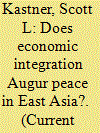

|
|
|
|
|
| Publication |
2011.
|
| Summary/Abstract |
At the end of the day, it is not clear that economic ties will act as a significant constraint on state behavior when high-stakes issues are on the table.
|
|
|
|
|
|
|
|
|
|
|
|
|
|
|
|
| 6 |
ID:
106725


|
|
|
|
|
| Publication |
2011.
|
| Summary/Abstract |
It has become apparent that a policy of isolation, sanctions, lack of dialogue, and 'strategic patience' has not worked to weaken North Korea or alter its behavior, much less bring the regime down.
|
|
|
|
|
|
|
|
|
|
|
|
|
|
|
|
| 7 |
ID:
092506
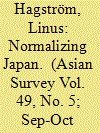

|
|
|
| 8 |
ID:
108556


|
|
|
|
|
| Publication |
2011.
|
| Summary/Abstract |
The threat from North Korea is likely to continue with the apparent absence of
any intent or interest in giving up its nuclear ambitions in the near future. North
Korean provocations are likely to feature conventional weapons backed up by
Pyongyang's nuclear arsenal to deter any Korean and U.S. response against the
North. Overall, there is a possibility of further military challenges from the North
and a more unstable situation on the Korean peninsula, especially during the succession period apparently underway in North Korea. Therefore, resolving the
North Korean nuclear issue through the United Nations Security Council (UNSC)
could help the resumption of the Six-Party Talks (6PT). However, the complex
and intermingled goals of the 6PT are further limited by the new uranium enrichment program. During the present deadlock in these talks, Korea should support
the activities of the UNSC and North Korea Sanctions Committee, strongly
encourage the resumption of the 6PT, and make all diplomatic efforts to focus
international pressure on Pyongyang aimed at making it cease disrupting regional
security or furthering its nuclear ambitions. The best policy towards North Korea
is a peaceful solution of the nuclear crisis through the UNSC together with the
6PT.
|
|
|
|
|
|
|
|
|
|
|
|
|
|
|
|
| 9 |
ID:
117674
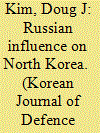

|
|
|
| 10 |
ID:
095759


|
|
|
|
|
| Publication |
2010.
|
| Summary/Abstract |
The relationship between America and North Korea is wavering between confrontation and communication depending on the policy choices of President Obama and Kim Jong Il. To have a realistic outlook upon the situation, it would be of significant value to categorize the relationship and to determine the South Korean government's countermeasures based on these categories. Based on the U. S.-North Korea relationship, four categories can be extracted. Soft-line and hard-line policies are possible political choices, and scenarios will be put forward based on a mixture of the two. South Korea's response to each category is reviewed in this paper.
|
|
|
|
|
|
|
|
|
|
|
|
|
|
|
|
|
|
|
|
|